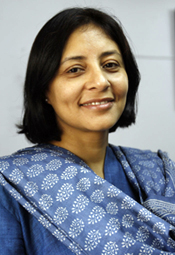A new research center at UC Santa Cruz, the Center for Analytical Finance (CAFIN), is bringing together top global researchers to investigate, generate new evidence, and propose policy solutions for ever-changing financial markets.
With funding from the Division of Social Sciences, CAFIN will focus on three critical areas of financial markets: systemic risk, market design, and financial access, said its director Nirvikar Singh, UCSC professor of economics.
The center's first event will feature a lecture by Professor Ila Patnaik, a CAFIN research affiliate who is an expert on India’s economy. It takes place Monday, October 28 at 3:30 p.m. in the Economics Conference Room (E2, room 499) on the UCSC campus.
Patnaik, an economist and journalist, has been named one of India's top 10 economists. She will pose the question: “Did Quantitative Easing Unleash a Monetary Tsunami for Emerging Economies?” Although emerging market policymakers have claimed that quantitative easing (QE) has unleashed a monetary tsunami on their financial markets, academic studies have so far found only small or even ambiguous effects. Patnaik argues that such studies have neglected the combined impact of QE on capital flows, exchange rates and interest rates, and shows how to overcome this measurement problem.
In the U.S., QE has had its own controversies, reflected in the debate about who should succeed Ben Bernanke as chair of the Federal Reserve. Patnaik presents the emerging market side of this story.
Patnaik is Reserve Bank of India Chair Professor at the National Institute of Public Finance and Policy in New Delhi. Her research focuses on capital flows, business cycles, the financial sector, and the study of Indian firms as India opens up its capital account. She recently joined the Carnegie Endowment for International Peace as a nonresident senior associate in the South Asia Program.
CAFIN's first focus is on systemic risk, the most prominent issue that surfaced from the global financial crisis, and understood as the potential collapse of the entire financial system. Researchers are interested in strengthening the understanding of the development, consequences and control of systemic risk, particularly when related to the banking sector and regulatory responses.
The second focus area derives from the fact that financial products have evolved faster than institutions and regulations. During the last several years, the creation of new and complex products through financial innovation has outstripped the development of appropriate new trading platforms and regulatory structures. This was a contributing factor of the 2008-2009 financial crisis.
Finally, CAFIN recognizes the importance of financial access for low-income individuals, small enterprises, and developing countries. However, according to CAFIN researchers, attempts to provide broader access to financial products, from subprime mortgages in the U.S. to microfinance in developing countries, can create unsustainable debt levels and increase the chance of a financial crisis. Therefore, they say, it is crucial to understand alternatives, such as using information technology, to expand financial access without jeopardizing the stability of the financial system.
New economic research center explores policy solutions, improvements to financial markets



